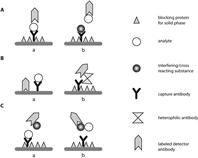I have several times pointed out that macro-TSH can result in TSH test results which are higher than they should be.
I had thought this issue was both well-known (among biochemists/lab scientists, at least) and that many or all testing facilities had taken steps to overcome the problem.
Seems not - from this new paper which identifies it in a UK lab:
Ann Clin Biochem. 2013 Jul 4. [Epub ahead of print]
An immunoglobulin G complexed form of thyroid-stimulating hormone (macro thyroid-stimulating hormone) is a cause of elevated serum thyroid-stimulating hormone concentration.
Mills F, Jeffery J, Mackenzie P, Cranfield A, Ayling RM.
Source
Department of Clinical Biochemistry, Derriford Hospital, Plymouth, UK.
Abstract
BACKGROUND:
Macrocomplexes can be the cause of elevated serum hormone concentrations and may cause diagnostic confusion. This is well recognized for prolactin and commonly screened for using polyethylene glycol (PEG) precipitation. The phenomenon and a suitable screening method is less familiar with respect to thyroid-stimulating hormone (TSH).
METHOD:
Samples sent to the laboratory for routine analysis of thyroid function and found to have a TSH >10?mU/L were evaluated to determine the prevalence of macro-TSH in the Roche Elecsys assay, using PEG precipitation with confirmation by gel filtration chromatography.
RESULTS:
Of 495 samples tested, 3 (0.6%) were found to have macro-TSH. From the distribution of recoveries, a cut-off <25% was determined for identifying samples requiring further investigation for the presence of macro-TSH.
CONCLUSION:
The prevalence of elevated TSH due to macro-TSH was found to be 0.6%. Laboratories should be aware of this cause of assay interference.
KEYWORDS:
Thyroid hormones, analytes, clinical studies, immunoassay, laboratory methods, thyroid disease
PMID:
23828944
ncbi.nlm.nih.gov/pubmed/238...
Macro-TSH is where a single antibody attaches itself to a molecule of TSH. These TSH-antibodies are widely mentioned with little discussion of their effects other than this testing problem.
Rod
